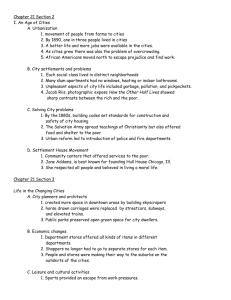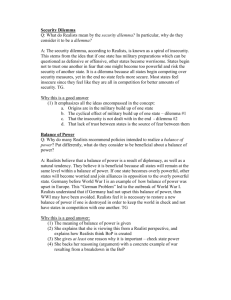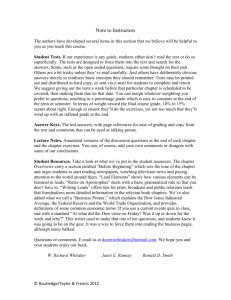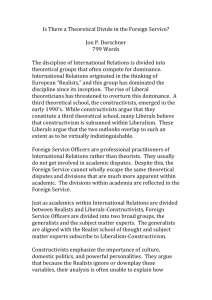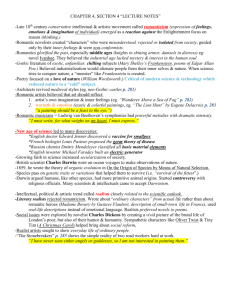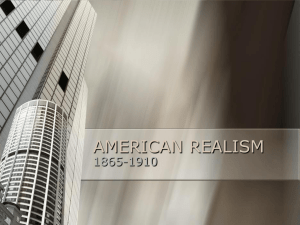Sheila is correct in pointing out that, in my reply, I merely repeated
advertisement
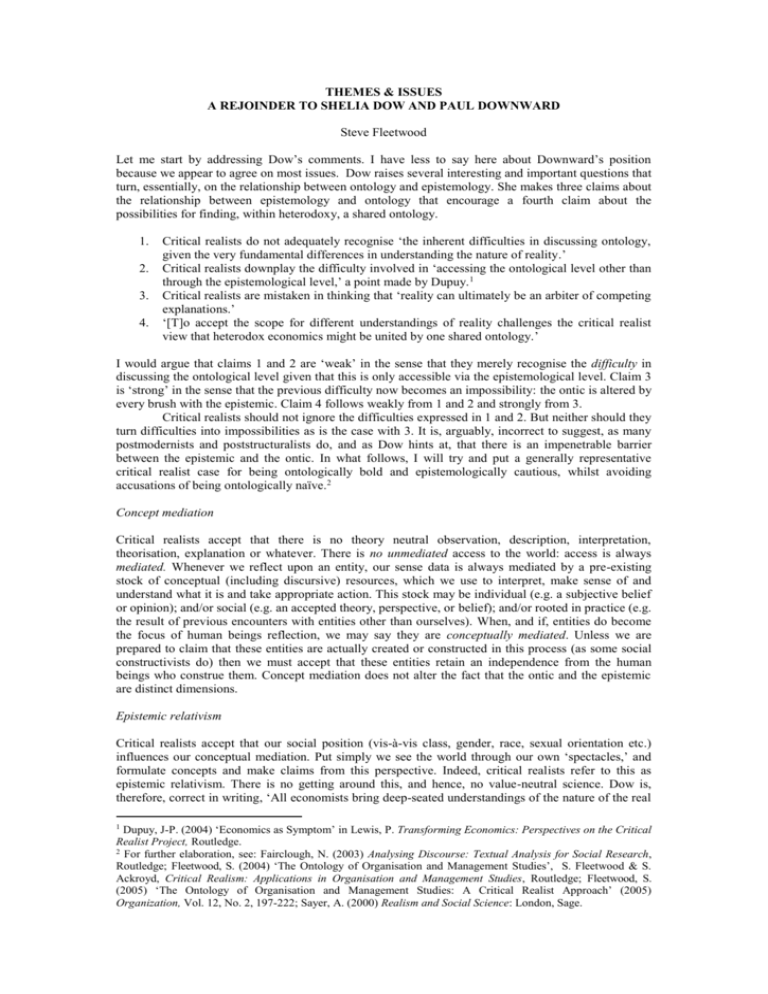
THEMES & ISSUES A REJOINDER TO SHELIA DOW AND PAUL DOWNWARD Steve Fleetwood Let me start by addressing Dow’s comments. I have less to say here about Downward’s position because we appear to agree on most issues. Dow raises several interesting and important questions that turn, essentially, on the relationship between ontology and epistemology. She makes three claims about the relationship between epistemology and ontology that encourage a fourth claim about the possibilities for finding, within heterodoxy, a shared ontology. 1. 2. 3. 4. Critical realists do not adequately recognise ‘the inherent difficulties in discussing ontology, given the very fundamental differences in understanding the nature of reality.’ Critical realists downplay the difficulty involved in ‘accessing the ontological level other than through the epistemological level,’ a point made by Dupuy. 1 Critical realists are mistaken in thinking that ‘reality can ultimately be an arbiter of competing explanations.’ ‘[T]o accept the scope for different understandings of reality challenges the critical realist view that heterodox economics might be united by one shared ontology.’ I would argue that claims 1 and 2 are ‘weak’ in the sense that they merely recognise the difficulty in discussing the ontological level given that this is only accessible via the epistemological level. Claim 3 is ‘strong’ in the sense that the previous difficulty now becomes an impossibility: the ontic is altered by every brush with the epistemic. Claim 4 follows weakly from 1 and 2 and strongly from 3. Critical realists should not ignore the difficulties expressed in 1 and 2. But neither should they turn difficulties into impossibilities as is the case with 3. It is, arguably, incorrect to suggest, as many postmodernists and poststructuralists do, and as Dow hints at, that there is an impenetrable barrier between the epistemic and the ontic. In what follows, I will try and put a generally representative critical realist case for being ontologically bold and epistemologically cautious, whilst avoiding accusations of being ontologically naïve.2 Concept mediation Critical realists accept that there is no theory neutral observation, description, interpretation, theorisation, explanation or whatever. There is no unmediated access to the world: access is always mediated. Whenever we reflect upon an entity, our sense data is always mediated by a pre-existing stock of conceptual (including discursive) resources, which we use to interpret, make sense of and understand what it is and take appropriate action. This stock may be individual (e.g. a subjective belief or opinion); and/or social (e.g. an accepted theory, perspective, or belief); and/or rooted in practice (e.g. the result of previous encounters with entities other than ourselves). When, and if, entities do become the focus of human beings reflection, we may say they are conceptually mediated. Unless we are prepared to claim that these entities are actually created or constructed in this process (as some social constructivists do) then we must accept that these entities retain an independence from the human beings who construe them. Concept mediation does not alter the fact that the ontic and the epistemic are distinct dimensions. Epistemic relativism Critical realists accept that our social position (vis-à-vis class, gender, race, sexual orientation etc.) influences our conceptual mediation. Put simply we see the world through our own ‘spectacles,’ and formulate concepts and make claims from this perspective. Indeed, critical realists refer to this as epistemic relativism. There is no getting around this, and hence, no value-neutral science. Dow is, therefore, correct in writing, ‘All economists bring deep-seated understandings of the nature of the real Dupuy, J-P. (2004) ‘Economics as Symptom’ in Lewis, P. Transforming Economics: Perspectives on the Critical Realist Project, Routledge. 2 For further elaboration, see: Fairclough, N. (2003) Analysing Discourse: Textual Analysis for Social Research, Routledge; Fleetwood, S. (2004) ‘The Ontology of Organisation and Management Studies’, S. Fleetwood & S. Ackroyd, Critical Realism: Applications in Organisation and Management Studies, Routledge; Fleetwood, S. (2005) ‘The Ontology of Organisation and Management Studies: A Critical Realist Approach’ (2005) Organization, Vol. 12, No. 2, 197-222; Sayer, A. (2000) Realism and Social Science: London, Sage. 1 world to their observation of the economy.’ She is also correct in citing Kuiper3 who writes: ‘economic science would be perceived as part of society and the researcher as specifically positioned in that society.’ She is incorrect, however, in observing, in critical realism, ‘an apparent reluctance both to accept and to seriously probe difference in meaning.’ Concept mediation and epistemic relativism, taken together, work against the claim that critical realists imply ‘what is revealed by concrete research is independent of the observer, while preconceived (a priori) notions are possible independent of experience.’ It is, of course, always possible that a critical realist (or any-one else for that matter) does not pay sufficient attention to the mediated nature of the concepts encouraged by the researcher’s own social position and, for example, reproduces a notion of human agency as reflecting a masculine set of values. If this happens, it is to be frowned upon, but I am not aware of anything inherent in critical realist meta-theory that prevents this kind of reflexivity. Judgmental relativism It is often claimed that, because of epistemic relativism, we cannot judge between competing claims about the world - a position referred to as judgmental relativism. Critical realists (and other antirelativists) accept empirical relativism whilst rejecting judgmental relativism. Recognizing the distinction between epistemic and judgmental relativism does not, of course, mean the process of adjudication is easy or unproblematic, on the contrary. But how we go about judging between competing claims is no longer a matter of meta-theory but of theory and empirical social science. Judging between competing claims One of the reasons critical realists seem relatively optimistic about the possibility of judging between competing claims, lies in the very position that Dow doubts namely that ‘reality can ultimately be an arbiter of competing explanations.’ For critical realists, reality is ultimately the arbiter when judging between competing claims. Whilst such judgement is far from easy, critical realists do not wish to turn a difficulty into an impossibility. Why might this be considered an impossibility? For many postmodernists and poststructuralists, especially those operating with a strong social constructionist ontology, ‘reality’ (note the scare quotes) is socially constructed by, let us say, a community – the term ‘strong’ means the ontology is exhausted by discourse, language, semiotics or some such. There are, therefore, potentially as many ‘realities’ as communities. If there are multiple ‘realities’ there is no single ‘reality’ against which to compare competing claims. All we can do is compare one claim about ‘reality’ to another claim about ‘reality.’ Ontology has collapsed into epistemology (what critical realists refer to as the epistemic fallacy) and we have well and truly entered the minefield of relativism. Critical realists do not enter this minefield because they have a fundamentally different ontology. For critical realists, there is only one reality, although as we saw above, there may be many understandings or interpretations of this reality. 4 If there is only one reality, the possibility remains of comparing competing claims to that reality. Claims are true or false in virtue of the way the world is. Clearly, undertaking such comparisons, especially for more complicated social phenomena, is difficult, often extremely so, but the real question is: Is it difficult, or is it impossible? Consider two claims: ‘one of the causal mechanisms generating the tendency for women to earn lower wages than men is women’s unpaid domestic labour;’ and ‘one of the causal mechanisms generating the tendency for women to earn lower wages than men is women’s inability to think logically.’ Clearly, judging between these competing claims is extremely difficult, but, is it impossible? If, ontologically speaking, we socially construct multiple ‘realities’ then it is impossible. Those whose ‘reality’ is that women cannot think logically, have nothing to compare their ‘reality’ to. If, ontologically speaking, there is one reality it is not impossible, just exceptionally difficult. The claim that women cannot think logically, can be compared to the nature of logical thinking. Kuiper, E. (2004) ‘Critical Realism and Feminist Economics’ in Lewis, P. Transforming Economics: Perspectives on the Critical Realist Project, Routledge, p 116. 4 To claim there is only one reality does not mean that critical realists have correctly identified this reality: they could be mistaken. The former is a meta-theoretical claim; the latter is a theoretical and/or empirical claim 3 To claim there is only one reality may seem elitist or culturally imperialist, but it is no more than to claim, for example, that on average, women earn lower wages than men. Claims like this are open to interpretation, introducing discussion of the meaning of ‘average,’ the meaning of ‘wages’ or whether the appropriate comparison is between full-time men and women or between full-time men and part-time women and so on. But sooner or later this interpretation process comes to an end, and claims are made. For critical realists, the claim that ‘women earn lower wages than men’ is true (or false) in virtue of the way the world is: that is, in virtue of the reality of women’s and men’s pay. It is instructive to see this against poststructuralist and postmodernist perspectives. For the poststructuralist, the interpretive process could go on indefinitely, or at least until we had agreed, pragmatically, upon a conventional definition. For the poststructuralist, a claim is ‘true’ or ‘false’ in virtue of convention: if a community agree X is ‘true,’ then X is ‘true’ and the nature of X itself is irrelevant. This perspective has several problems, of which I mention one. On this account, any definition would work just as well as another. Yet we know that some interpretations seem to work better than others. If this is not just an accident, where a community just happen to agree by luck or political expediency, then it may be that reality is lurking in the shadows, making the claim that ‘women get paid less than men’ a better interpretation of the social world than the claim that ‘men get paid less than women.’ For the postmodernist a claim is ‘true’ or ‘false’ in virtue of power’s ability to define it as ‘true’ or ‘false.’ Whilst critical realists accept completely that powerful groups may have the ability to have their version or interpretation of truth taken as true (even if it is false), they reject the argument that powerful groups can make a false claim true. No matter how powerful the group, it cannot make the (false) claim that ‘men get paid less than women’ true. A powerful group might, of course, be able to do is have this false claim accepted as true. Ontology and epistemology Prioritising reality in the sense of using it to arbitrate between competing claims means prioritising ontology (statements of being) over epistemology (statements of knowledge of being). There is, however, another sense in which ontology is prioritised over epistemology. Critical realists maintain that the way the world is, should determine the way we go about studying it. This is, of course, diametrically opposed to those who adopt a deductivist method. Deductivists allow the way they study the world to be determined by the way they think knowledge is gained: they start with the deductivist toolkit. For critical realists, this is putting the cart before the horse. To maintain that the way the world is, should determine the way we go about studying it is also diametrically opposed to versions of postmodernism and poststructuralism that employ a strong social constructionist ontology. In this case, the process of gaining knowledge of the world creates or constructs the world: ontology is collapsed into epistemology and an epistemic fallacy is committed. Dow is, therefore, quite correct to note the difficulty involved in ‘accessing the ontological level other than through the epistemological level,’ a point made by Dupuy.5 But unless Sheila is prepared to commit to an ontic realm that can exist independently of the epistemic realm, then, she flirts with a strong social constructionist ontology, and runs the risk not only of committing the epistemic fallacy, but of entering the relativist minefield. Ontology and discourse Kuiper6 is not the first to criticize critical realists for (allegedly) ignoring the ‘structuring power of language.’ This ignores recent work by critical realists in discourse. Reed7 for example, notes that discourses such as financial audit, quality control and risk management, are ‘generative mechanisms’ with ‘performative potential’. Consider the example of skill and gender. In some cases, female workers possess skills similar to those possessed by (comparable) male workers. Sexist discourse not only draws our attention to ‘women’s’ skills’ it draws our attention to them in ways that present them as being of a lower skill level. And of course, once these skills are discursively downgraded, discrimination in the labour market and the workplace often follows. Many would say that these downgraded skills are socially constructed and I would agree. I refrain from using this phraseology, however, because it carries too much unwanted baggage. Working alongside this discourse, however, Dupuy, J-P. (2004) ‘Economics as Symptom’ in Lewis, P. Transforming Economics: Perspectives on the Critical Realist Project, Routledge. 6 Op cit. p 119. 7 Reed, M. (2000) ‘The Limits of Discourse Analysis in Organizational Analysis, Organization Vol. 7(3), p 529. 5 are extra-discursive factors that also cause discrimination. Many female workers simply do not possess skills similar to (comparable) male workers. There are various reasons for this such as women’s restricted access to jobs where skill attainment is possible. This is often caused by intermittent labour market activity which is, in turn, caused by the requirements of domestic labour. In this case, the lower skill level is not caused by sexist discourse, but by extra-discursive factors.8 Objectivity Dow takes me to task for dichotomising relativism with an apparently ‘objective understanding of reality,’ where the term ‘objective’ has a pejorative connotation. Critical realists do use the term ‘objective,’ but only with care. Sayer has a useful three-fold distinction of the term ‘objective’ - and its co-relative, ‘subjective’:9 Objective1 means value-neutral or impartial as in ‘I personally don’t stand to gain or lose from this situation, so I can perhaps give a more objective account of it’. Correspondingly, subjective1 means value-laden or partial, as in ‘I’ve known her as a friend for years so my views on her are subjective’. Objective2 means something taken to be objectively known or true, like women, on average, earn less than men. Correspondingly subjective2 implies that something is ‘not true’ or is ‘merely a matter of opinion’. Objective3 refers to objects, to the nature of things independent of their identification by humans, as in ‘the objective properties of money’. This corresponds to subjective3 which refers to subjects and concerns what we think about something such as the ‘subjective experience of class.’ Disambiguated in this way, and not forgetting the ontological and epistemological nuances mentioned above, there is no reason to abandon the concept of ‘objectivity’ as if it was a hopelessly naïve empiricist prejudice. Moreover, if we accept there is only one reality (with many understandings or interpretations of it) and thereby avoid the minefield of relativism, then there is no reason why an ‘objective understanding of reality’ should be beyond the wit of economists - although it may be extremely difficult to obtain. I want to leave this section by reflecting upon two of Dow’s important comments: [T]o accept the scope for different understandings of reality challenges the critical realist view that heterodox economics might be united by one shared ontology. [M]asculine presuppositions may help to explain what Kuiper perceives as Lawson’s ‘overoptimis[m] about the scope for comparing and evaluating theories and ontologies on the basis of empirical research,’ (p. 119). It seems to me that Dow’s real concern, here, is that critical realist’s naïve approach to the relation between ontology and epistemology (re-read the comments 1, 2, and 3 at the start of this rejoinder) exaggerates the possibilities for agreement between heterodox economists. Without wishing to knitpick, what Kuiper actually writes is worth mentioning because a degree of confusion is revealed in it. Kuiper writes that Lawson’s ‘epistemology is overtly optimistic about the scope for comparing and evaluating theories and ontologies on the basis of empirical research,’ [emphasis added]. To the extent that Lawson, and critical realists more generally, are optimistic, their optimism comes from their ontology, not their epistemology. In opposition to postmodernist and poststructuralist perspectives, especially those employing a strong social constructivist ontology, critical realists are ontologically committed to the belief that there is only one reality, although this must be taken with all the nuances presented above. If true, then this holds out the possibility that, whilst comparing and evaluating theories and ontologies may be difficult, it is not impossible - hence, the degree of our optimism. Furthermore, if critical realists have not adequately reflected upon the ‘structuring power of language in science,’ as Kuiper (ibid) suggests, and Dow seems to agree, this is not because something in critical realist meta-theory prevents it, but simply because critical realists have not done it: they have For further elaboration see: Fairclough, N., Jessop, B. and Sayer, A. (2002), ‘Critical Realism and Semiosis’, Journal of Critical Realism, 5 (1): 2-10. 9 ** 8 not engaged in sociology of scientific knowledge. If, however, critical realists were to engage in this kind of reflection, as postmodernists have, critical realists’ ontological commitments would prevent them from falling into the traps that many postmodernists have fallen into, namely constructing multiple ‘realities,’ committing the epistemic fallacy and walking into the relativist minefield. In sum, there is no reason why critical realists’ ontological and epistemological insights cannot be used to reflect upon their own understanding of heterodox economics to good effect. This does not mean agreement will happen overnight, but it does mean agreement is possible. If we operate with Dow’s ‘stronger’ ontological and epistemological commitments, then not only is agreement between heterodox economists difficult, or even impossible, so too is agreement between any one school, such as Post Keynesians. If, by contrast, we operate with Dow’s ‘weaker’ commitments, then whilst agreement between heterodox economists, and/or between any one school and another might be difficult, it is not impossible. I leave a question for Dow: are her ontological commitments ‘strong’ or ‘weak’ - is agreement difficult, or impossible? Chick and Dow on open and closed systems In Dow’s rejoinder, she requests that, rather than merely re-state the critical realist understanding of open and closed systems, which she disagrees with, I respond to her comments instead. In order to do this, however, it is necessary to discuss a recent paper Dow has co-authored with Victoria Chick and to which she refers in her comments.10 Whilst this carefully argued paper warrants a more elaborate response than can reasonably be given in a rejoinder, I will try to offer a limited response, in the hope of stimulating further discussion. Chick and Dow are correct in their observation that ‘Lawson only gives criteria for closure’ (p. 374). They interpret this as a weakness relative to their conceptualisation, because they establish conditions for both closed and open systems. Whilst this might look like a quibble, this observation goes to the heart of the differences between critical realists and Chick & Dow – which does not mean that these parties disagree on everything, far from it. Chick and Dow’s starting point lies in extant definitions of closed and open systems. They make use of the Oxford English Dictionary to define a system, as an ‘interconnection within a collection of things or ideas that can be regarded as having a recognizable coherence or unity.’ (p. 364). They use this source again for the following definitions: ‘open system, a material system in which total mass or energy fluctuates; an incomplete or alterable system (of ideas, things, etc.). ‘closed system, a complete and essentially unalterable system (of ideas, things, etc.); a material system in which the mass or energy remains constant; a self contained realm, unaffected by external forces’ (ibid 365)11 From these beginnings Chick and Dow formulate a list of conditions that characterise open and closed systems. In the cases of both open and closed systems, the focus is firmly upon the structure, conditions, or foundations of the systems and, it is important to note that they do not mention event regularities (or their absence) as conditions for closure and openness. A critical realist starting point, by contrast, is very different, for reasons that are rooted in wider critical realist meta-theory. Critical realists often proceed by attempting to find common ground with their opponent, an agreed principle, and then try to show, via transcendental reasoning, that their opponent’s ontological presuppositions are incompatible with this starting point. Thus the starting point for many critical realists is to establish that both they, and mainstream economists, agree that mainstream economics is based on the use of the deductive method.12 They then try to show, via transcendental reasoning, that the ontological presuppositions of the deductive method are at odds with the way the socio-economic world is. Put another way, the deductive method would only be appropriate, if the socio-economic world was other than it is. This singles out what is, arguably, the key Chick, V. Dow, S. (2005) ‘The Meaning of Open Systems’, Journal of Economic Methodology. ** Chick and Dow (2005) consider a couple of other definitions, but mentioning them would not alter my point. 12 The deductive mode of theorising (or simply ‘deductivism’ is also variously known as: the covering law model; Popper-Hempel theory of explanation; the deductive-nomological or D-N model (nomos being Greek for law); and where the law is statistical the D-N model becomes the I-P model (‘inductive probabilistic’). Hausman also sees the D-N model as the “dominant view” amongst economists. Hausman, D. (1992) The Inexact and Separate Science of Economics, Cambridge, Cambridge University Press), p. 288-9. Critical realists are not agreed on whether the appropriate starting point should be the use of: positivism, ‘scientism’ empirical realism, or simply mathematics. For our purposes it does not matter because I suspect any of these starting points can be shown to be incompatible with the ontology they presuppose. 10 11 presupposition of deductivism, namely, event regularities. Critical realists then try to demonstrate that event regularities only occur in very special situations which they call closed systems. Chick and Dow would probably agree that event regularities only occur in special situations, but would differ in their unwillingness to define closed systems as those displaying event regularities. Let us see how the argument is made by considering the following stylized representation of the typical philosophical commitments made by anyone committed to the deductive method – be they mainstream economists, Marxists, Post-Keynesians, New Institutionalists or whomever: Central to the way deductivism is operationalised are events expressed as functional relations between variables that measure (or proxy) these events. They are generalised as y = f(x) or y = f(x1,...xn). These can also be expressed as laws and styled ‘whenever event x then event y’ or ‘whenever events x1,...xn, then event y’. It is very important to note that events and their regularities are the basis upon which any mathematical or econometric specification is derived. Consider the absurdity of trying to write something like y = sometimes f(x1,...xn).The absurdity is removed at a stroke when the irregularity associated with the term ‘sometimes’ is removed. If functional relations and laws are to have economic meaning (as opposed to ‘mere’ mathematical meaning) then they must imply causality. Causality renders them intelligible. The clear implication of writing q = f(p), for example, is that the quantity demanded or supplied varies with, and is caused to vary by, price. Functional relations and laws are not, however, rendered intelligible by just any account of causality. Rather, they are rendered intelligible by an account of causality based upon events and their regularities — an account which derives from the work of Hume, on which more below. Laws, of this form, are often referred to as Humean. Epistemologically speaking, if particular knowledge is derived from observing events, then generalized (or scientific) knowledge can only be derived from observing patterns in these events – an inchoate flux of events would be wholly unenlightening. This epistemological claim to generalized knowledge, then, is rendered intelligible when and if these events reveal themselves in patterns, especially event regularities. Event regularities make the deduction or prediction of some event or set of events from antecedents possible. Event regularities drive the nomological machinery of the deductivist method. The events that constitute the constant conjunctions cannot be other than unique, individual and atomistic, since any connection or relation between them would be itself impervious to experience or observation. In this case the nature of the connections would require prior explanation, thus undermining the explanatory power of observation. Because ontology is confined to that which is experienced or observed the ontology is empirical; and because these objects are thought to exist independently of one’s identification of them, it is realist. The ontology can therefore be labeled empirical realist and consists of the atomistic events of sense experience or observation. The deductivist method and the functional relations and laws that operationalise it are rendered intelligible, therefore, by the generation of knowledge (epistemology) via event regularities and closed systems. Causality as constant event conjunctions means that if some event is observed, one can only seek its cause in terms of another observed event. There is nowhere else to seek a cause because any other domain in this ontological spectrum is ruled out: causality in terms of transfactually acting powers, argued by critical realists to be a superior notion of causality cannot be theorized via the deductivist method. Event regularities and closed systems, however, are extremely rare in socio-economic systems, which appear to be better defined as open systems without event regularities. The ontological presuppositions of the deductive method are, therefore, at odds with the way the socio-economic world is. The deductive method would only be appropriate, if the socio-economic world was other than it is. In sum, critical realists do not, therefore, start from their own (or others) definitions of open and closed systems, rather they arrive at a definition on the grounds that event regularities are necessarily presupposed by anyone employing deductivist method. Hence they call systems where event regularities occur, closed systems. Critical realists define closed systems on the grounds of event regularities, not on the properties of closed systems. By extension, critical realists define open systems on the grounds of lack of event regularities, not on the properties of open systems. This is in part because listing the conditions of an open system, in terms of a set of (structural) conditions is likely to be a never ending process: it would be tantamount to listing everything that had an impact on the system. Chick and Dow might even agree with this as they note that: ‘it is the nature of open systems that this list should not be taken as exhaustive’ (p. 366). What, then, is at stake in all this? According to Chick and Dow, the difference between them and critical realists lies in the fact that critical realists define openness and closure in terms of event regularities whereas they define it in terms of the structure (conditions, foundations) of the system. They go on to add that this difference does not matter (‘it is a matter of indifference’ or ‘neutrality’ (pp. 370-4) under certain conditions. This suggests several possibilities ‘For closed systems’ (373) they are neutral (to closure in terms of event regularities or in terms of structure) if the system is ‘perfect’ and (a sufficient number of the) closure conditions are met. In this case ‘event regularities in theory and empirically are a consequence.’ Here critical realists and Chick and Dow agree, but for different reasons, and these reasons generate different consequences, as will become clear in a moment. Matters are different, however, if one of the closure conditions is unmet (e.g. ‘there are missing variables’). They are non-neutral. In this case ‘the behaviour of the dependent variable will not exhibit event regularity in practice [empirically] whether the theoretical system is open or closed’ (373). This is tantamount to writing: for closed systems, where closure conditions are not met, there are no event regularities in practice. This is, of course, a contradiction for a critical realist because a closed systems, where closure conditions are not met and where there are no event regularities is an open system. It is not a contradiction for Chick & Dow because they define a closed system in terms of its structure not event regularities. They add ‘some regularities will survive the shifting boundaries of some open systems’ (ibid: 372-3) which again, for a critical realist, is a contradiction. Here critical realists and Chick and Dow disagree, but much seems to turn on semantics. For open systems they are always non-neutral because the (Dow) conditions for openness may allow event regularity or irregularity: ‘event regularity can be consistent with an open theoretical system as we define it’ (ibid: 371). Chick and Dow give the following example of event regularity in an open theoretical system: ‘the hypothesis “if income rises, consumption will rise,” is a postulated event regularity (though understood to be subject to lags and individual variations, is fundamental to Keynes’s theory) that models real world features.’ Here critical realists and Chick and Dow disagree, and not just on semantics. Most heterodox economists would take mainstream economists/deductivists to task for offering the hypothesis ‘as wages rise, demand for labour falls), writing Ld = f(w), along with some conditions of labour demand, on the grounds that event regularities of this kind do not occur in practice. Yet the hypothesis ‘if income rises, consumption will rise, written C = f (I) along with clauses about lags and individual variations, is meta-theoretically speaking, identical to mainstream economists/deductivist offering. To accept C = f (I) whilst rejecting Ld = f(w) is to disagree with mainstream economists on substance only, not in terms of meta-theory. Let me turn, for a moment, to Paul Downward. I have far less to say about Paul’s rejoinder, on the grounds that we largely agree. Where we probably disagree, is over the role of statistical analysis – and here I have in mind, not descriptive statistics, but techniques such as regression, correlation or factor analysis. Paul is more willing than me to accept the use of statistical analysis as one technique, alongside various other qualitative techniques, to investigate the outcome of tendencies generated through the action of agents and structures. Now whilst I am not entirely sure, I see no reason to believe that Chick and Dow disagree with Paul on this, especially since they write: [W]e see great virtue in devices such as ceteris paribus, designed to keep some aspects of reality at bay temporarily, thus allowing analysis to proceed. We have no objections to complete closures so long as they are in place only temporarily…To us, the fact that an economic system has some (provisional, partial) structure provides the basis for theoretical structures, even closed-system models. (376-378). Whilst the plea for pluralism sounds entirely plausible, I remain unconvinced – although I admit to being a ‘hard-liner’ on this, so caveat emptor. I simply doubt the usefulness of much statistical analysis. Allow me to put forward my reasoning on this, as much to stimulate future comment as anything else.13 I noted above that event regularities, typically expressed as functional relations, styled y = f(x1,...xn), are the basis upon which any mathematical or econometric specification is derived. But functional relations are rendered intelligible only by the generation of generalized (or scientific) knowledge via event regularities, closed systems and causality as event regularity. And all this presupposes an ontology of empirical realism. To accept that statistical analysis has a role to play, then, is to accept event regularities, closed systems, causality as regularity event regularities and an ontology of empirical realism. If, as I do, I reject this deductivist paraphernalia, I cannot then accept ‘a bit’ of it in order to allow the use of (say) regression alongside ethnography. The use of ethnography does not require me to make ontological presuppositions that are at odds with the way I believe the socioeconomic world to be, unlike regression which requires precisely that. The question I would put to Sheila, and Paul, and indeed to anyone who is prepared to use statistical techniques, and/or some form of formalized model building is this: what are your ontological propositions, and are they compatible, or at odds, with the way you believe the world is? See also Fleetwood, S. ‘A Critical Realist Reply to Walters and Young’ (2005) Review of Political Economy, Vol. 17, No. 4, 1-14; and Fleetwood, S. ‘Causal Laws, Functional Relations and Tendencies’ (2001), Review of Political Economy, Vol. 13, No. 2, 201-220. 13
